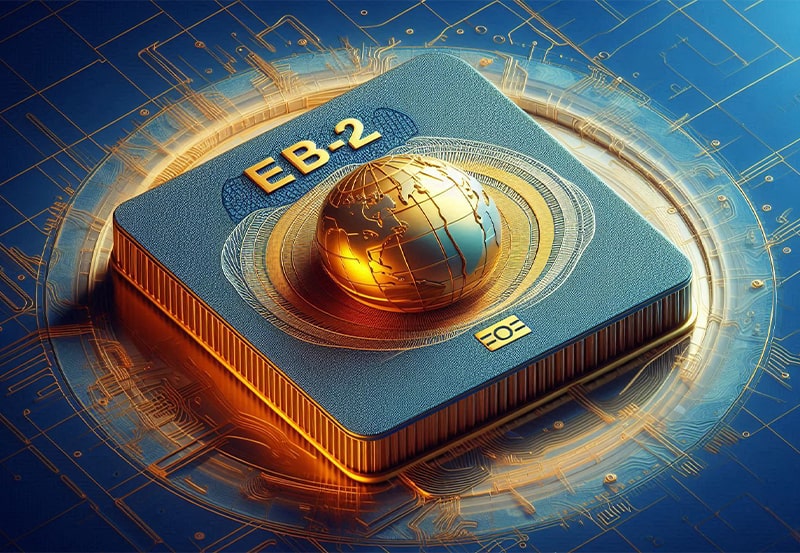The EB-2 visa is a U.S. immigration category designed for individuals with an advanced degree or exceptional ability in their field. It offers a pathway to permanent residency (green card) for skilled professionals and individuals who can contribute significantly to the U.S. economy or society.
There are two primary categories of eligibility for the EB-2 visa:
- Exceptional Ability: Individuals who have demonstrated exceptional ability in the sciences, arts, or business. This category often requires a high level of achievement and recognition in the field.
- Advanced Degree: Individuals who possess a master’s degree or higher in a specific field and whose job requires such a degree.
Table of Contents
 EB-2 Visa Advanced Degree Category
EB-2 Visa Advanced Degree Category
An advanced degree for EB-2 purposes generally refers to a master’s degree or higher in a specific field of study. This includes degrees like:
- Master of Science (M.S.)
- Master of Arts (M.A.)
- Doctor of Philosophy (Ph.D.)
- Juris Doctor (J.D.)
- Master of Business Administration (MBA)
The job you apply for must require an advanced degree as a minimum qualification. This means that the employer should be able to demonstrate that the position cannot be filled by someone with a lower level of education.
In some cases, it may be possible to substitute work experience for a higher degree. For example, if you have a bachelor’s degree and several years of progressive experience in the field, you might be able to qualify. However, this is less common and depends on the specific requirements of the job and the prevailing labor market conditions.
Some examples of occupations that often qualify under the advanced degree category include:
- Engineers
- Scientists
- Doctors
- Lawyers
- Professors
- Accountants
- Computer programmers
- Architects
- Business analysts
It’s important to note that this is not an exhaustive list, and other professions may also qualify depending on the specific job requirements and the prevailing labor market conditions.
Do You Have a Destination In Mind
Launchroad can help you find the perfect country for your startup. Schedule a free demo today.
 EB-2 Visa Exceptional Ability Category
EB-2 Visa Exceptional Ability Category
Unlike the advanced degree category, the exceptional ability category focuses on demonstrated excellence in a particular field. It requires a level of expertise that is significantly above what is normally found in the sciences, arts, or business.
To qualify under the exceptional ability category, you must meet at least three of the following criteria:
- Official academic record: This could include a degree, diploma, certificate, or similar award from a college, university, or other institution of learning.
- Letters from current or former employers: These letters should document at least 10 years of full-time experience in your occupation and highlight your exceptional abilities.
- License or certification: A professional license or certification in your field can be strong evidence of exceptional ability.
- Salary or remuneration: A high salary or other significant compensation can indicate exceptional ability, especially if it is substantially above the average for your profession.
- Membership in professional associations: Membership in prestigious professional associations can be a sign of recognition and expertise.
- Recognition for achievements: Awards, prizes, or other forms of recognition from peers, government entities, or professional organizations can be evidence of exceptional ability.
While the exceptional ability category is often associated with fields like science, arts, and business, it can also apply to individuals in other professions who have achieved a remarkable level of success. Some examples include:
- Athletes: Professional athletes who have achieved international recognition.
- Artists: Painters, musicians, sculptors, or other artists who have exhibited their work in prestigious venues.
- Business executives: CEOs or other high-level executives who have led successful companies.
- Engineers: Engineers who have significantly contributed to their field through inventions, research, or other achievements.
- Writers: Authors or journalists who have published widely recognized works.
It’s important to note that the specific criteria and evidence required for the exceptional ability category can vary depending on the field and the individual’s circumstances.
 Labor Certification
Labor Certification
The Department of Labor (DOL) plays a crucial role in the EB-2 visa process. The DOL is responsible for issuing a labor certification, which confirms that there is no suitable U.S. worker available for the position you are applying for.
The labor certification process involves several steps, including:
- Job offer: Your employer must offer you a job that meets specific requirements, such as being full-time and paying a prevailing wage.
- Recruitment: Your employer must make a good-faith effort to recruit qualified U.S. workers for the position. This may involve placing advertisements, contacting labor unions, and other recruitment efforts.
- Application: Your employer will submit an application for labor certification to the DOL.
- Review: The DOL will review the application to determine if the requirements have been met.
- Decision: The DOL will either approve or deny the labor certification.
If the DOL approves the labor certification, your employer can then file an immigrant petition with the U.S. Citizenship and Immigration Services (USCIS).
In certain cases, the labor certification requirement may be waived through a National Interest Waiver (NIW). This applies to individuals whose work is considered to be in the national interest of the United States.
To qualify for a NIW, you must demonstrate that your proposed endeavor has substantial merit and national importance, that you are well-positioned to advance it, and that it would be beneficial to the United States to waive the labor certification requirement.
If you believe you qualify for a NIW, you can file a petition directly with USCIS without going through the labor certification process.
 National Interest Waiver (NIW)
National Interest Waiver (NIW)
A National Interest Waiver (NIW) is a process that allows certain individuals to bypass the typical labor certification requirements for an EB-2 visa. It is available for those whose work is considered to be in the national interest of the United States.
To qualify for a NIW, you must demonstrate that your proposed endeavor meets the following three criteria:
- Substantial merit and national importance: Your work must have significant value and benefit to the United States. This could include contributions to science, technology, arts, culture, or other areas of national interest.
- Well-positioned to advance the endeavor: You must have the necessary skills, experience, and qualifications to successfully carry out your proposed work.
- Beneficial to the United States: The overall benefit to the United States of waiving the labor certification requirement must outweigh any potential negative impacts.
Some examples of cases where a NIW might be granted include:
- Researchers: Scientists or engineers who are working on groundbreaking research that could have significant benefits for the United States.
- Entrepreneurs: Business founders who have established innovative companies with the potential to create jobs and economic growth.
- Artists: Musicians, actors, or other artists who have achieved international recognition and are making significant contributions to their field.
- Professors: University professors who are conducting important research or teaching highly specialized subjects.
 Benefits of EB-2 Visa
Benefits of EB-2 Visa
Obtaining an EB-2 visa offers several significant benefits, including:
- Permanent Residency: The EB-2 visa leads to a green card, which grants you permanent residency status in the United States. This allows you to live and work anywhere in the country without restrictions.
- Work Authorization: As a permanent resident, you have the right to work for any employer in the United States. You are not limited to the specific employer who sponsored your visa.
- Eligibility for Citizenship: After a certain period of residency as a permanent resident, you may become eligible to apply for U.S. citizenship. This will grant you full rights and privileges as a U.S. citizen.
- Family Benefits: Your spouse and unmarried children under the age of 21 may be eligible to obtain derivative visas and join you in the United States.
- Opportunity for Advancement: Permanent residency in the United States provides you with greater opportunities for career advancement, education, and personal growth.
Overall, the EB-2 visa offers a valuable pathway to permanent residency and a brighter future in the United States.
 EB-2 Visa Process and Timeline
EB-2 Visa Process and Timeline
The EB-2 visa application process typically involves several steps:
- Job Offer: Your employer must offer you a job that meets the requirements for the EB-2 category, such as requiring an advanced degree or exceptional ability.
- Labor Certification: In most cases, your employer will need to obtain a labor certification from the Department of Labor, confirming that there is no suitable U.S. worker available for the position.
- Immigrant Petition: Your employer will then file an immigrant petition (Form I-140) with USCIS.
- Priority Date: Your priority date is the date your immigrant petition was filed. This date determines your place in line for a visa number.
- Visa Number Availability: Once a visa number becomes available based on your priority date, you can apply for a visa at a U.S. consulate or embassy in your home country.
- Adjustment of Status: If you are already in the United States on a temporary visa, you may be able to adjust your status to permanent resident.
The processing time for an EB-2 visa can vary significantly depending on several factors, including:
- Country of Origin: The processing time can be longer for applicants from certain countries with higher visa demand.
- Priority Date: The closer your priority date is to the current visa bulletin, the sooner you can expect to receive a visa number.
- Completeness of Application: A complete and well-documented application can help expedite the process.
The overall timeline can be lengthy, and it may take several years to obtain a green card through the EB-2 process.
 Conclusion
Conclusion
The EB-2 visa offers a valuable pathway to permanent residency in the United States for individuals with advanced degrees or exceptional abilities. To qualify, you must meet specific requirements related to your education, experience, and the job you are applying for.
The process can be complex and time-consuming, involving labor certification, immigrant petition, and visa number availability. It’s important to understand the various steps involved and the potential challenges that may arise.
If you are considering applying for an EB-2 visa, it is highly recommended to consult with an immigration attorney who specializes in this area.
Role of Launchroad in The Seccess of Your Startup Visa

LaunchRoad is your trusted partner for starting a business abroad. We guide you in choosing the right country, understanding visa requirements, and getting your startup off the ground. As an experienced startup visa consultant, we offer expert startup visa consultation to help you navigate the complexities of international expansion. Our team provides the support, mentorship, and resources you need to succeed in the global market.
Other EB visas you might be interested in:
USA EB-1 Visa Process: Tips and Strategies
Is the EB-3 Visa Right for You? A Detailed Analysis
EB-4 Visa: A full Guide for Skilled Workers
What is a U.S. EB-5 visa, and how to apply?
FAQ
Are EB2 visas still available?
Yes, EB-2 visas are still available. They are one of the employment-based visa categories for immigration to the United States.
Will EB2 become current?
The availability of EB-2 visa numbers can fluctuate depending on the demand from different countries and the overall number of visas issued. It's difficult to predict exactly when EB-2 will become "current," meaning there are visas available for applicants with a specific priority date. However, you can check the Visa Bulletin, which is published monthly by the Department of State, for the latest information on visa availability.
Is EB2 or EB3 better?
Whether EB-2 or EB-3 is better for you depends on your specific circumstances. EB-2 generally requires a higher level of education or experience, but it may also have a shorter wait time for a visa number. EB-3 is for skilled workers with a bachelor's degree or its equivalent, but it may have a longer wait time. It's important to consult with an immigration attorney to determine which category is best suited for your situation.
Can EB2 be upgraded to EB1?
Yes, in certain circumstances, an EB-2 visa can be upgraded to EB-1. This usually requires demonstrating that you have achieved a level of exceptional ability that meets the criteria for EB-1 classification. However, the specific requirements and process can vary depending on your situation.
Does EB2 require sponsorship?
Typically, yes, EB-2 requires sponsorship from a U.S. employer. The employer must demonstrate that there is a bona fide job offer for you and that they have the ability to pay the prevailing wage. However, in some cases, individuals may be eligible for a National Interest Waiver (NIW), which allows them to self-petition without an employer sponsor.
Can EB2 NIW downgrade to EB3?
No, an EB-2 NIW cannot be downgraded to EB-3. If your NIW petition is denied, you would need to start the process over again, possibly in a different category.
Can EB2 be converted to EB1?
Yes, in certain circumstances, an EB-2 visa can be converted to EB-1. This usually requires demonstrating that you have achieved a level of exceptional ability that meets the criteria for EB-1 classification. However, the specific requirements and process can vary depending on your situation.
Can EB2 NIW be expedited?
It may be possible to expedite an EB-2 NIW application in certain cases, such as if you have a medical condition or other compelling reason. However, there is no guarantee that your application will be expedited, and the process can still take some time.
Can EB2 spouse work?
Yes, the spouse of an EB-2 visa holder can obtain a work permit after entering the United States. They will need to apply for an Employment Authorization Document (EAD) from the USCIS.
Can EB2 downgrade to EB3?
No, an EB-2 visa cannot be downgraded to EB-3. If you are unable to meet the requirements for EB-2, you would need to start the process over again, possibly in a different category.
Can you apply for EB2 by yourself?
Yes, you can apply for an EB-2 visa by yourself through a National Interest Waiver (NIW). This allows you to petition for yourself without an employer sponsor. However, it's important to note that the NIW process can be complex and requires strong evidence to support your application.
Can an employer file EB2 NIW?
No, only the beneficiary (the individual seeking the EB-2 visa) can file an EB-2 NIW petition.
Does EB2 NIW require PERM?
No, EB-2 NIW does not require a PERM labor certification. The NIW process is designed to bypass the traditional labor certification requirements for individuals whose work is considered to be in the national interest of the United States.
Does EB2 have premium processing?
Yes, EB-2 visas are eligible for premium processing. This allows you to pay an additional fee to expedite the processing of your application. However, premium processing does not guarantee a faster approval time, and it may not be available for all cases.
Does EB2 NIW require an employer?
No, EB-2 NIW does not require an employer. This is one of the main benefits of the NIW process, as it allows individuals to self-petition without the need for an employer sponsor.
Does EB-2 NIW have premium processing?
Yes, EB-2 NIW is eligible for premium processing. This allows you to pay an additional fee to expedite the processing of your application. However, premium processing does not guarantee a faster approval time, and it may not be available for all cases.
Does EB-2 NIW require an interview?
It may or may not require an interview. Whether or not you will be required to attend an interview depends on various factors, such as your country of residence and the specific circumstances of your case.
Does EB-2 require H1B?
No, EB-2 does not require an H-1B visa. However, if you are already in the United States on an H-1B visa, you may be able to adjust your status to permanent resident through the EB-2 process.
Can I have both EB-2 and EB-3 I-140?
No, you cannot have both an EB-2 and an EB-3 I-140 petition pending at the same time. You must choose one category and proceed with that application.
Is EB-2 faster than EB-3?
Generally, yes, EB-2 can be faster than EB-3. This is because EB-2 often has a lower demand for visa numbers, which can result in shorter wait times. However, the actual wait time can vary depending on your country of origin and other factors.
How to apply for EB-2 visa?
To apply for an EB-2 visa, you will typically need to follow these steps:
- Obtain a job offer: Your employer must offer you a job that meets the requirements for the EB-2 category.
- Obtain a labor certification: If you are not applying through a National Interest Waiver, your employer will need to obtain a labor certification from the Department of Labor.
- File an immigrant petition: Your employer will file an immigrant petition (Form I-140) with USCIS.
- Wait for a visa number: Once a visa number becomes available based on your priority date, you can apply for a visa at a U.S. consulate or embassy in your home country.
- Adjust your status: If you are already in the United States on a temporary visa, you may be able to adjust your status to permanent resident.
How to convert EB-2 to EB1?
To convert EB-2 to EB-1, you will typically need to demonstrate that you have achieved a level of exceptional ability that meets the criteria for EB-1 classification. This may require additional evidence, such as awards, publications, or recognition from your peers. You will also need to file a new immigrant petition with USCIS.
Is EB-2 NIW going to be canceled?
There is no indication that EB-2 NIW is going to be canceled. It remains a viable option for individuals who meet the requirements.
Is EB-2 a green card?
Yes, an EB-2 visa leads to a green card, which grants you permanent residency status in the United States.
Is EB-2 NIW faster than EB-2?
It can be, but it's not guaranteed. While EB-2 NIW can potentially bypass the labor certification process, the overall processing time can still vary depending on various factors, such as the demand for visa numbers and the complexity of your case.
Is EB-2 NIW hard to get?
Yes, EB-2 NIW can be challenging to obtain. It requires strong evidence to demonstrate that your work is in the national interest of the United States, and the competition for visa numbers can be high.
Does EB2 require labor certification?
Typically, yes. EB-2 requires a labor certification, which confirms that there is no suitable U.S. worker available for the position you are applying for. However, there is an exception for individuals who qualify for a National Interest Waiver (NIW).
What is EB2 category?
There are two main categories of eligibility for EB-2:
- Advanced Degree: Individuals who possess a master's degree or higher in a specific field and whose job requires such a degree.
- Exceptional Ability: Individuals who have demonstrated exceptional ability in the sciences, arts, or business.
What is EB2 priority date?
Your EB-2 priority date is the date your immigrant petition was filed with USCIS. This date determines your place in line for a visa number.
What is EB2 NIW priority date?
EB-2 NIW petitions do not have a priority date. Instead, they are prioritized based on the date they were filed with USCIS.
What is EB2 NIW process?
The EB-2 NIW process involves:
- Preparing your application: This includes gathering evidence to support your claim of exceptional ability or national interest.
- Filing the petition: You will file your NIW petition with USCIS.
- Waiting for a decision: USCIS will review your petition and make a decision.
How long does the EB2 process take?
The processing time for EB-2 can vary significantly depending on various factors, such as your country of origin, the demand for visas, and the complexity of your case. It can take several years to obtain a green card through the EB-2 process.
Why are EB2 dates not moving?
The movement of EB-2 dates depends on the demand for visas and the availability of numbers. If there are more applicants than available visas, the dates may not move quickly.
Who qualifies for EB2 NIW?
To qualify for EB-2 NIW, you must demonstrate that your work is in the national interest of the United States and that you have exceptional ability or merit.
Is it worth waiting for a green card in EB2?
Whether it's worth waiting for a green card in EB-2 depends on your individual circumstances and priorities. If you are eligible for EB-2 and believe that the benefits of permanent residency outweigh the potential challenges, then it may be worth pursuing.

 EB-2 Visa Advanced Degree Category
EB-2 Visa Advanced Degree Category EB-2 Visa Exceptional Ability Category
EB-2 Visa Exceptional Ability Category Labor Certification
Labor Certification National Interest Waiver (NIW)
National Interest Waiver (NIW) Benefits of EB-2 Visa
Benefits of EB-2 Visa EB-2 Visa Process and Timeline
EB-2 Visa Process and Timeline Conclusion
Conclusion







Leave a Reply